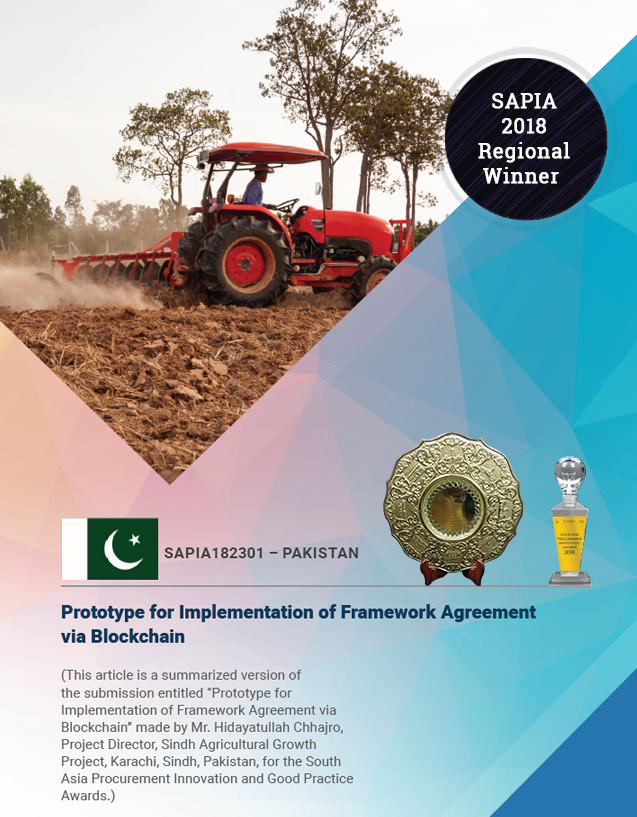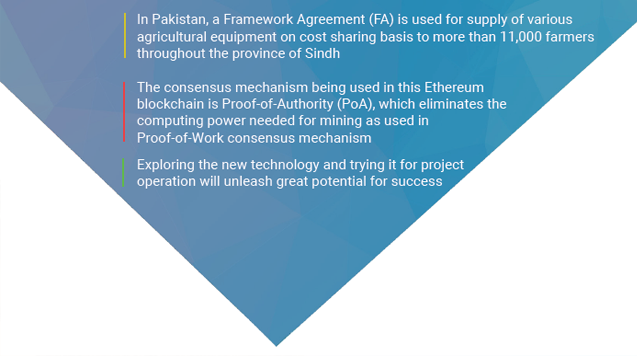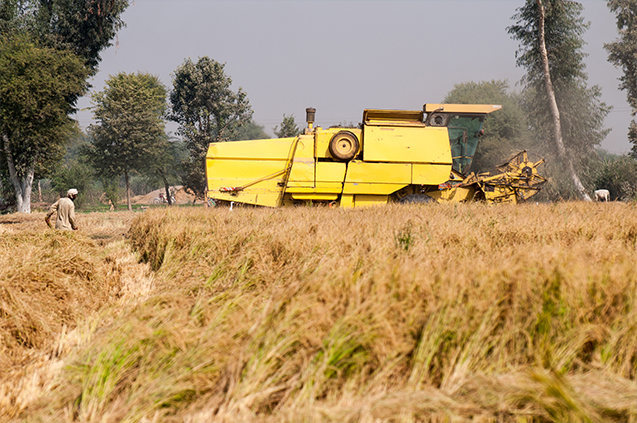Feature Stories
- How Bangladesh bridged the gap between amateur and professional in government procurement
- Rated Criteria: Promoting Value in World Bank Procurement
- Public Procurement Transformation in Bangladesh
- Achievement of Value for Money and Enhancement of Efficiency, Economy and Transparency in Procurement - Document Archive System
Archives
- End-to-End Procurement Planning and Maintenance System Integrated with Project MIS
- Application of Construction Milestones in Rural Road Contracts of Nepal
- Gross National Happiness Model for Pursuing Sustainable Public Procurement
- Government procurement is the basis of wide opportunities for enterprise development
- The Challenges of Procurement Training in a Fragile Country: the Afghanistan Experience
- When and How to Open Contracts: Transparency and Engagement through World Bank Projects
- Innovations and Best Practices in Procurement Processes of Disaster Recovery Projects
- World Bank Experts Discuss Global Procurement Trends and Armenia's e-GP system with the National Assembly
- Technology driving transparent and accountable public procurement reform in Bangladesh
- Prototype for Implementation of Framework Agreement via Blockchain
- Construction Project Planning and Management Capacity Building in India: A Wholistic Approach to Boost Infrastructure Development
- Zimbabwe: Public Procurement reform to catalyze greater transparency and development
- 15th Procurement, Integrity, Management and Openness (PRIMO) Forum
- e-Procurement World Map
- Preventing and controlling corruption: A modern approach to Procurement
- 6th South Asia Public Procurement Conference held in Thimphu, Bhutan
- South Asia Procurement Innovation Awards 2018 Announced
- Procurement iNET completes 5 years and new CPPP Fastest 100% Challenge Launched
- Risky Business: Does Debarring Poor Performers Mitigate Future Performance Risk?
- Global Procurement Summit 2019, New Delhi, India
- World Bank India launches Survey for International Civil Works Contractors
- World Bank launches new Complaints Module in Systematic Tracking of Exchanges in Procurement (STEP) System
- New Open Contracting Data Standard for e-Procurement Systems Launched
- Bangladesh's success in public procurement: Sustained reform really pays off
- The five drivers for improving public sector performance: Lessons from the new World Bank Global Report
- South Asia Public Procurement Innovation Awards 2018
- Conversation with Khaled Elarbi, President, High Authority for Public Procurement (HAICOP), Tunisia on the Digitalization of Public Procurement
- Breaking the glass ceiling in Africa: Rwanda E-Government Procurement System
- How government e-marketplace is revolutionizing procurement in India
- Ensuring Value for Money in Infrastructure Projects - The Botswana way
- Blockchain Lessons for Procurement
- Botswana’s Benevolent Move to Enhance its Procurement Profession
- Achieving Better Value for Money Using e-Auction for Procurement of Goods by Public Sector - A Success Case from DPDC
- Guide to Project Management and Contract Management (GPMCM) – New Approach to Improve Efficiency and Effectiveness of Procurement Outcomes
- Regional Winners of SAPIA 2017 participate in 8th International Public Procurement Conference (IPPC 8) Arusha, Tanzania
- The Future of Public Procurement in the Era of Digitalization
- World Bank Operations Procurement Helping Turkey to Procure a US$2 Billion Gas Storage Facility
- Unlocking Energy Efficiency Market in India - Through Innovative Procurement Business Model
- Getting value for money: Creating an automated market place for farmers in Pakistan
- Towards a Single Market for Public Procurement in Caribbean Small States
- Web-Based Online Evaluation Tool (e-Tool) for Procurement of Works by Royal Government of Bhutan
- Strengthening Health Sector Procurement System Offer Hopes for Universal Health Coverage in Nepal
- Morocco makes Strides in Modernizing its Public Procurement System— Operationalization of the Procurement Regulatory Body
- Innovations in Procurement Process and Selection that Lead to Improved Outcomes – Tenderers’ Database Management System
- Looking Back and Forward: The World Bank’s Procurement Framework
- Independent Monitoring and Evaluation of Contracted Health Services Leads to Improved Outcomes in Rural Areas of Afghanistan
- Fifth South Asia Region Public Procurement Conference brings focus on Procurement in Public Service Delivery
- 12 Procurement Innovations from South Asian Countries Celebrated
- Social Media is Improving Procurement in Lao PDR
- ASEAN meeting explores ways of professionalizing public procurement to meet development challenges
- Second International Training Program on the World Bank’s New Procurement Framework
- South Asia Procurement Innovations Award 2017 launched with Bigger and Better Prizes
- How to bid, finding opportunities, what makes a successful bid
- Pushing boundaries in procurement framework implementation
- Experience of Developing PPSD for the Assam Agribusiness and Rural Transformation Project (APART), India
- An Electronic Approach: Streamlining Georgia's Procurement
- South Asia Heads of Procurement Knowledge Exchange Program to U.S. Government Procurement Systems started
- 13th Procurement, Integrity, Management and Openness (PRIMO) Forum - a Documentary
- Bangladesh to strengthen public procurement with World Bank supported Project
- Establishment of Technology-Based Health Procurement and Supply Chain Management System, and Capacity Development in Tamil Nadu Medical Services Corporation
- Towards a Single Market for Public Procurement in Caribbean Small States
- Redefining Procurement as an Innovative and Collaborative Centre of Excellence for Best-in-Class Sourcing Solution
- India’s PowerGrid Endorsed for Alternative Procurement Arrangements by the World Bank
- Achieving Value for Money in Indonesia’s Geothermal Project
- Citizen Monitoring of Rural Roads Under Pradhan Mantri Gram Sadak Yojana (PMGSY), India
- Establishment of Grant and Service Contract Management Unit (GCMU) to Manage Contracting Out of Health Services in Afghanistan
- Procurement for Regional Development–Public Policy Initiative in Sri Lanka
- PPAF Community-Driven Development (CDD) Procurement Model, Pakistan
- Making Successful Procurement of IT Systems - An Experience from Vietnam
- Procurement Observatories continue to deliver in India
- Implementation of National e-GP System in Nepal
- Government e-Marketplace (GeM), India
- Africa High Level Public Procurement and Electronic Government Procurement Forums
- Development of Procurement Cadre as Part of Holistic Procurement Reforms in Bhutan
- Modernizing Public Procurement in Zimbabwe, one Step at a Time
- Citizen Engagement During Public Procurement Implementation in Bangladesh
- Winter 2017 Virtual Procurement, Integrity, Management, and Openness (PRIMO) Forum on Sanctions and Debarment Systems
- Close and Personalized Procurement Monitoring, Leading to Procurement Efficiency in Irrigation Sector in Fragile and Challenging Environments of Afghanistan
- Procurement Framework 2016 offers wider choices to ‘Go to Market’ based on PPSD
- Procurement Framework 2016 - Benefits, Status of Roll-out and M&E Arrangements
- PPSD offers Fit for Purpose Procurement Solutions
- Global Procurement Summit
- Fourth South Asia Region Public Procurement Conference
- The World Bank e-Procurement Tools
- South Asia Procurement Innovations Awards, 2016
- Learning Videos launched on STEP, online tracking tool on procurement for World Bank Projects
- Open e-Learning is Building a Cadre of Procurement Experts
- South Asia Region Public Procurement Conference, 2017
- Online Certificate Program in Public Procurement in Arabic Launched in Egypt
- First Procurement Knowledge Exchange Forum among ASEAN Countries
- Nobel Prize in Economics for contribution to Theory of Contract
- The Africa Region Harnesses Integrated e-Government Procurement (e-GP) Systems in Pursuit of Transparency and Integrity
- Procurement Reform for Humanitarian and Development Challenges in Kurdistan Region of Iraq (KRI)
- Successful Procurement is not just a set of Activities, it is a Strategy
- Afghanistan - Trends and Recent Developments in Governance
- PPSD is an Opportunity for clients and staff for Improved Procurement Management
- Procurement Reform Advances in the MENA Region
- Data Analysis and Collaborative Work in Action for Expedited Disbursements in Africa
- Ensuring Good Governance in Procurement in Sri Lanka
- New Procurement System to Improve Development Impact and Transparency in South Asia
- World Bank, USTDA Formalize Procurement Partnership
- How the New Procurement Framework Will Benefit 45.6 Million People in India
- Procuring the Future
- Reasons to Bid, Finding Business Opportunities
- New World Bank Procurement Framework Promotes Strengthened National Procurement Systems
- The readiness for Procurement Framework 2016
- 6 Things to know about New Procurement Framework
Prototype for Implementation of Framework Agreement via Blockchain

Challenge(s) Addressed
The real challenge addressed is a trusted database with real-time information from different stakeholders. Blockchain does not depend on a central authority but restricts copying for FA to record ransactions and get real time data of the farmers, which streamlines the process of procurement, improves transparency, enhances trust in data, and reduces human error. This data will be available to all the parties concerned. The implementation also has security benefits where the data is secured in the encrypted database and no single party can control the flow of information. In this regard, it may be noted that the blockchain technology is not new or untested in the market. It is a combination of already proven, tried and tested methods which help the users to own their data and maintain their privacy, security and freedom.

Impacts
Currently, there is no real-time data to track the agricultural equipment supply process. The whole cycle/process of issuing the purchase order to supplier, receiving the equipment from supplier, then delivering this equipment to farmers, and finally getting delivery confirmation from a farmer is scattered between manual and electronic forms. The absence of data linkages across the full procurement cycle increases the level of errors and incorrect reporting, which eventually reduces trust on the data. There is a great opportunity to record the complete process of equipment financing procurement on an immutable distributed ledger. With this ledger, each actor's actions would be recorded in real-time, and it can be viewed at any given time without compromising on data integrity by the participating actors.
Level of Innovation/Good PracticeBlockchain vs traditional MIS: The traditional MIS systems provide a centralized design where one entity is in control of the system and other entities using the system depend on that entity to provide transparency and integrity of information maintained by the system. This requires all other entities to trust one entity. Blockchain, however, provides transparency, integrity and immutability of the information without requiring entities to trust each other, or to even select a central control entity. The World Bank's Blockchain Lab team applied the “Blockchain Fit” framework developed by the lab to this challenge. This framework helped the team analyze whether Blockchain was a good fit for this challenge and helped us clarify the benefits of blockchain over traditional systems. The challenge focused on bringing transparency to the business transactions. Therefore, the team decided to use a permissioned Ethereum blockchain, which allows for transactions that are visible to all entities who have access to the Ethereum blockchain. The consensus mechanism being used in this Ethereum blockchain is Proof-of-Authority (PoA), which eliminates the computing power needed for mining as used in Proof-of-Work consensus mechanism.
Replicability and Sustainability
There are many projects in public sector that use FA approach for contracts where the quantity and the actual users/ beneficiaries are not defined. The use of Blockchain can help in implementing the FA-based activities in a more transparent manner. This will bring more accountability and monitoring of actual implementation and ensure that funds are utilized for intended purpose. The idea can be easily replicated to the activities under FA approach whether it is used for construction, education and skills or in healthcare. The blockchain platform transactions under FA will be an ideal combination for meeting the fiduciary requirements. Based on the use of this prototype, the World Bank Blockchain lab recently received a request from Kenya Education Unit to apply the same methodology in the context of the challenges they are facing around lack of transparency. Pakistan Government's top priority is to improve the Governance structure in the country: more transparent systems can bring trust into the current environment as part of a broader e-government initiative. This is a step towards achieving this dimension and there is a great interest of Government in rolling out the prototype in the field. There is also a challenge fund opportunity available at the World Bank - Disruptive Technologies for Development (DT4D) for which the team intends to apply to roll out this project in the field.

Lessons Learned
Technology based solutions, especially blockchain, are sometimes perceived as a challenging task to implement. Therefore, it is good to develop use case, prototype, test the results and then take an informed decision to go with a full implementation in the field. There is great potential in these new technologies. However, due to lack of knowledge and understanding, teams are reluctant to try it. Exploring the new technology and trying it for project operation will unleash great potential for success.
